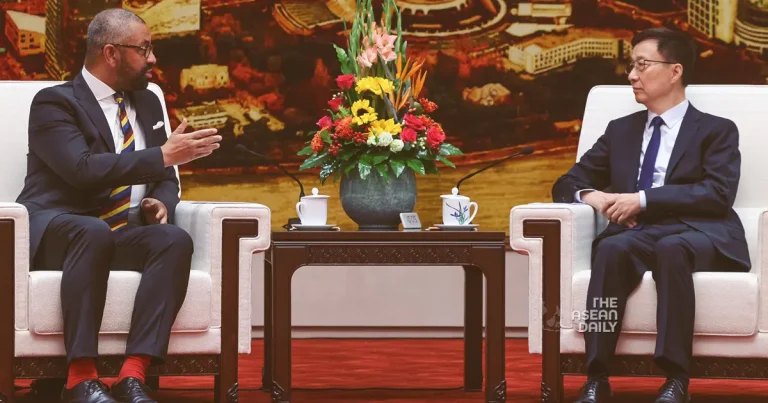30-8-2023 (LONDON) During the first visit to Beijing by a UK foreign secretary in five years, James Cleverly has emphasized that it would be a mistake to try to isolate China. Cleverly, who met with China’s vice-president, Han Zheng, on Wednesday, expressed the UK’s intention to maintain a pragmatic relationship with China despite acknowledging disagreements.
In his meetings with Chinese officials, Cleverly highlighted the need for direct and open communication to avoid misunderstandings. He stressed the importance of addressing challenges and differences that exist between countries in bilateral relations. Cleverly’s visit comes amidst concerns over Beijing’s approach towards Taiwan and its support for Russia, both of which are expected to be discussed during his diplomatic engagements.
Cleverly emphasized that engaging with China doesn’t mean shying away from difficult conversations. He asserted that voicing concerns directly and face-to-face is crucial, indicating a commitment to addressing contentious issues. Cleverly’s visit was originally scheduled for July but was postponed due to the sudden change in China’s foreign minister.
The visit takes place against the backdrop of a significant report from the British foreign affairs select committee, which calls for a zero-tolerance stance against Beijing’s “transnational repression.” The report criticizes the UK government for lacking coherence in its approach to China and urges the release of an unclassified version of its China Strategy to the public. It also suggests that the UK seek to include South Korea and Japan in the Aukus pact and join the Quad, two informal multilateral groups that Beijing perceives as anti-China.
While Cleverly’s visit aims to restore political dialogue and trade between China and the UK, concerns remain about the extent of its impact. Observers suggest that China’s policies are ultimately dictated by President Xi Jinping, and Cleverly’s visit may have limitations in influencing Beijing’s stance. The report’s reference to Taiwan as an independent country and its call for greater international recognition may provoke backlash from Beijing, as it strongly opposes any actions that legitimize Taiwan’s sovereignty.
The UK’s objection to Beijing’s crackdown on rights and freedoms in Hong Kong has also strained relations between the two countries. Cleverly’s visit provides an opportunity to address these concerns and assert the UK’s position on human rights issues. However, the extent to which Cleverly can effect change is uncertain, as China’s policies are determined by President Xi’s agenda.
As Cleverly continues his diplomatic discussions in Beijing, the focus remains on fostering a pragmatic relationship while addressing areas of disagreement and promoting mutual understanding. The outcome of these engagements will contribute to shaping China-UK relations and determining the future trajectory of bilateral cooperation.




